

National Agriculture in the Classroom. Permaculture - What Is It and Why Is It Important? 18th March 2015 By Phil Watt Guest Writer for Wake Up World Developed by Australians Bill Mollison and David Holmgren in the 1970’s, permaculture has spread wildly throughout the world.

The term initially meant ‘permanent agriculture’, however it evolved to also represent ‘permanent culture’. Permaculture is the ethical, scientific and synchronistic design of natural systems to ensure a sustainable philosophy of living. Lesson Plans / RHS Campaign for School Gardening. A simple activity such as growing herbs can teach most of the basic gardening skills, and lead on to learning about food and healthy eating.
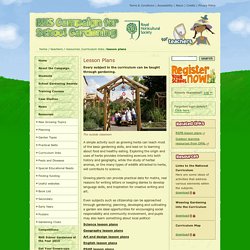
Exploring the origin and uses of herbs provides interesting avenues into both history and geography, while the study of herbal aromas, or the many types of wildlife attracted to herbs, will contribute to science. Growing plants can provide practical data for maths, real reasons for writing letters or keeping diaries to develop language skills, and inspiration for creative writing and art. Even subjects such as citizenship can be approached through gardening; planning, developing and cultivating a garden are ideal opportunities for encouraging social responsibility and community involvement, and pupils may also learn something about local politics!
Science lesson plans. The New York Botanical Garden. Below you will find educational resources for K – 8 teachers who are integrating a garden into their school's curriculum.
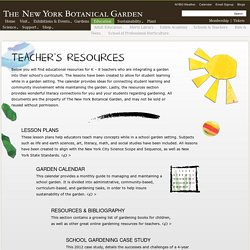
The lessons have been created to allow for student learning while in a garden setting. The calendar provides ideas for connecting student learning and community involvement while maintaining the garden. Cornell Garden-Based Learning » Home. School Garden Wizard: Plan for Success: Creating a Vision. The planning stages of a school garden is crucial to a successful outcome.
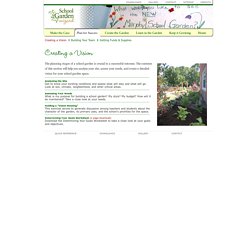
The contents of this section will help you analyze your site, assess your needs, and create a detailed vision for your school garden space. Analyzing the Site Get to know your existing conditions and assess what will stay and what will go. Extreme Urban Gardening: Straw Bale Gardens. Here’s a very simple technique for gardening in tight spots and in places with no/terrible soil (from the arctic circle to the desert to an asphalt jungle).
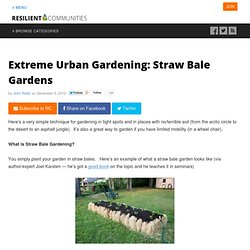
It’s also a great way to garden if you have limited mobility (in a wheel chair). What is Straw Bale Gardening? You simply plant your garden in straw bales. Here’s an example of what a straw bale garden looks like (via author/expert Joel Karsten — he’s got a good book on the topic and he teaches it in seminars) As you can see, the basic technique is actually quite simple. The Urban Farming Guys.
Grow Fresh Vegetables Year Round Without A Garden. Did you know that you can have a source of fresh vegetables that are available all year long without the need of a grocery store or garden?
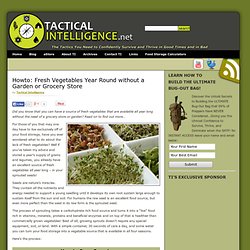
Read on to find out more… For those of you that may one day have to live exclusively off of your food storage, have you ever wondered what to do about the lack of fresh vegetables? Well if you’ve taken my advice and stored a year’s supply of grains and legumes, you already have an excellent source of fresh vegetables all year long – in your sprouted seeds! Ideas For The Easiest Garden On Earth. Farm To School Resources For Teachers. Farm to School connects schools (K-12) and local farms by serving healthy meals in school cafeterias, improving student nutrition, providing food, farm, and nutrition education, and supporting local, family farmers. There are over 2,000 farm to school programs nationwide.
Farm to school activities can include featuring fresh, local food in school meals, hands-on cooking and taste testing, edible school gardening, field trips to farms, and standards-based experiential learning in the classroom. Over the last decade, teachers have been discovering creative ways to teach kids about food and farming, while at the same time meeting standards-based requirements in science, math, social studies, and literature. Here are some of our favorite resources below. To stay up to date on farm to school happenings around the state, sign up for the Georgia Organics monthly Farm to School e-Bite newsletter. Gardens. Sophie and her friends work together to grow a neighborhood vegetable garden.
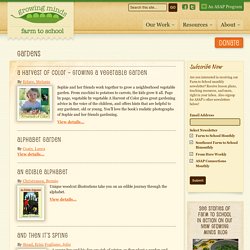
From zucchini to potatoes to carrots, the kids grow it all. Page by page, vegetable by vegetable A Harvest of Color gives great gardening advice in the voice of the children, and offers hints that are helpful to any gardener, old or young. You’ll love the book’s realistic photographs of Sophie and her friends gardening. Unique woodcut illustrations take you on an edible journey through the alphabet. A young boy and his dog are sick of winter, so they plant a garden and begin to wait. School Gardens - Growing Minds. Growing Minds trains individuals to establish Farm to School gardens and to integrate gardening into state and national curriculum.
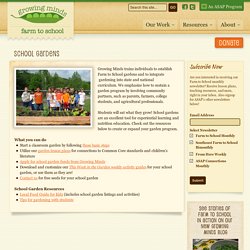
We emphasize how to sustain a garden program by involving community partners, such as parents, farmers, college students, and agricultural professionals. Students will eat what they grow! School gardens are an excellent tool for experiential learning and nutrition education. School Garden Weekly. Gardening resources for schools[1]